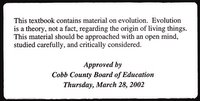Intelligent Design shutdown
 Placing a sticker in a biology textbook that claims evolution is “a theory, not a fact” is disingenuous. If it has to be stated that evolution is a theory, in this way, shouldn't they also be clamoring for physics texts to includes stickers warning students that gravity is also just a theory? Including this sticker suggests the idea that there is a vast controversy among scientists about evolution theory when there just isn't. This is a laughable idea. There is a fringe group of scientists working on competing theories, but no where near the numbers needed or the amount of respect for such competing theories to justify it being taught in schools.
Placing a sticker in a biology textbook that claims evolution is “a theory, not a fact” is disingenuous. If it has to be stated that evolution is a theory, in this way, shouldn't they also be clamoring for physics texts to includes stickers warning students that gravity is also just a theory? Including this sticker suggests the idea that there is a vast controversy among scientists about evolution theory when there just isn't. This is a laughable idea. There is a fringe group of scientists working on competing theories, but no where near the numbers needed or the amount of respect for such competing theories to justify it being taught in schools.
There is an argument that we should teach both theories and let students decide. Fortunately, it's not up to a collective of students to rule on the state of scientific theories. Equal time for one a competing theory of evolution won't be justified until it gains equal respect in the scientific community. It won't gain any respect until it can demonstrate a testable hypothesis and useful predictions.
In my mind, this quote from Jones solidifies his responsible handling of the case:
“To be sure, Darwin's theory of evolution is imperfect. However, the fact that a scientific theory cannot yet render an explanation on every point should not be used as a pretext to thrust an untestable alternative hypothesis grounded in religion into the science classroom or to misrepresent well-established scientific propositions”




9 Comments:
Behold, the first post to contain an image. I think I'll keep this up.
Apparently I'm also a spam blog... "Blogger's spam-prevention robots have detected that your blog has characteristics of a spam blog."I have to do Word Verification just to post. I fully deny this allegation of course. Perhaps my blog is too chock full of great links? I sent them a letter, they'll check it out and quickly correct the mistake, I'm sure.
By Aaron, on 12/22/2005 7:10 AM
Aaron, on 12/22/2005 7:10 AM
In the second paragraph, "fridge" should be "fringe". Though as it stands it conjures up some amusing imagery.
By Lucas, on 12/22/2005 12:10 PM
Lucas, on 12/22/2005 12:10 PM
Thanks Luke. I'm glad to have the editing help.
By Aaron, on 12/22/2005 3:58 PM
Aaron, on 12/22/2005 3:58 PM
I think they should teach Intelligent Design in schools, but in the proper course: philosophy.
There they can study the logic of ID and study the question: Who made the intelligent designer(s)?
If intelligence is irreducibly complex, than a designer must have designed our intelligent designer.
They could then also get into the philosophy of science and study excluded middle and the problems with negative hypothesis.
By Anonymous, on 12/22/2005 4:28 PM
Anonymous, on 12/22/2005 4:28 PM
ID, while tied back to religion, doesn't claim any morality or ethics of it's own. So it's not a true philosophy. It could be studied in part, under the direction of a real philosophy that examines human nature. Could be very interesting as long as enough science made it into the class.
Even more than philosophy, I think ID would be an interesting topic when looked at in a culture class. There, the history of one culture's teaching and education can be examined as well as histories of science and religion.
I haven't heard of a “negative hypothesis” specifically, but I'm guessing it's along the lines of trying to prove a negative? Like trying to disprove God.
By Aaron, on 12/22/2005 5:03 PM
Aaron, on 12/22/2005 5:03 PM
I feel like a very narrow definition of philosophy is being argued. I didn't know philosophy needed it's own ethics. But what do I know? I'm off to consult the dictionary to arm myself for future discussions.
Hmm. That wasn't really on topic.
By Anonymous, on 12/22/2005 9:54 PM
Anonymous, on 12/22/2005 9:54 PM
You're right Amanda. I'm using what I think to be the typical questions a philosophy attempts to answer: metaphysics, epistemology, aesthetics/ethics, and polotics/logic. This does in turn narrow the field a bit.
By Aaron, on 12/23/2005 12:29 AM
Aaron, on 12/23/2005 12:29 AM
I've always thought of philosophy as what happens when you take science and mathematics away: you're left with people arguing using logic. It's people trying to answer questions that basically can't be answered: "does god exist?", "what is real?", "what's morally correct?". The main concern of philosophers seems to be logical consistency, which is what ID people want to include in the definition of science. They want to allow philosophical arguments that get nowhere because philosophers don't care about empiricism.
All ID arguments I've seen rest on having a negative hypothesis, where the absence of evidence becomes proof. Empiricism requires a positive hypothesis so tests can be performed.
Here's a scenario: There is no evidence that my car arrived out of natural causes, therefore my car must have been created by an intelligent designer.
Here's a better way to prove that cars are built by people: go to the factory and actually see them build it! Now it's a positive hypothesis, my car is built by people not because I'm unimaginative or unknowledgable enough to conceive of a natural way my car was created, but instead directly observed my car being created by intelligent designers.
By Anonymous, on 12/23/2005 3:12 PM
Anonymous, on 12/23/2005 3:12 PM
I wanted to share this related controversy happening in California.
The Univerisity of CA schools are the only state schools in the nation to have the power to 'approve' classes taught in high school and reject classes that do not meet admission standards. Some classes in Christian schools have been denied accredidation because they used "Christian" biology books as the primary textbook for biology class. An alliance of these Christian schools has sued for "viewpoint discrimination".
An excerpt from the biology book used, "Biology for Christian Schools" published by Bob Jones University Press:
“The people who have prepared this book have tried consistently to put the Word of God first and science second. To the best of the author's knowledge, the conclusions drawn from observable facts that are presented in this book agree with the Scriptures. If a mistake has been made (which is probable since this book was prepared by humans) and at any point God's Word is not put first, the author apologises.”
At least they don't try to hide anything.
By Anonymous, on 12/28/2005 3:01 PM
Anonymous, on 12/28/2005 3:01 PM
Post a Comment
<< Home